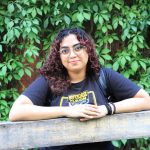Inuit youth get chance to connect through 9-month fellowship
21 youth leaders from across Alaska, Canada, and Greenland chosen for the fellowship
Gail Wallace, pictured here while participating in Students on Ice in 2018, is one of three Nunavummiut awarded the inaugural 2023 Arctic Resilient Communities Youth Fellowship. (Photo courtesy of Gail Wallace)
Updated on Thursday, Feb. 9, 2023 at 1:30 p.m.
Three Nunavummiut and seven Greenlanders have been awarded the inaugural 2023 Arctic Resilient Communities Youth Fellowship.
Gail Wallace from Rankin Inlet, Jukipa Kotierk from Igloolik and Jody Tulurialik from Taloyoak are among those selected. Nivi Rosing, Illuna Sørensen, and Miyuki Daorana from Nuuk, Greenland; Juliane Aronsen from Kangaatsiaq, Greenland; Edna Lyberth from Maniitsoq, Greenland; Kirsten Petersen from Sisimiut, Greenland; and Freyja Stefansdottir from Kujalleq, Greenland are the other seven fellows.
The aim of the nine-month fellowship is to bring together 21 Arctic young adults aged 18 to 30 to discuss and develop community-based projects on topics related to climate change, green energy, Indigenous knowledge and Arctic governance.
That will be done through virtual seminars and in-person workshops in Alaska, Canada and Greenland.
The first in-person workshop will be in Alaska from March 23 to 28, to coincide with the Arctic Encounter Symposium.
Wallace, a counselling program manager at Pulaarvik Kablu Friendship Centre in Rankin Inlet, said she applied for the fellowship because it would give her a chance to connect with others.
“It was a great opportunity to meet with other individuals from across the Arctic who care about making positive changes in our communities,” she said.
Wallace has already been a leader in her community in myriad ways. In 2018, she participated in Students on Ice, which takes youth on expeditions to the polar regions, she cofounded an organization that helps urban Inuit in Winnipeg, and attended the Arctic Leaders’ Summit in Finland in 2019.
For Wallace, the fellowship is an opportunity to dive deep into systemic issues in the region, as well as make “those important connections with like-minded individuals.”
“A couple of the themes I’m excited to be engaged in are social changes in the Arctic like housing, food security, health and employment,” she told Nunatsiaq News.
“[As well], international interest in the Arctic region including the geopolitical competition, the issues of sovereignty and self-determination, and governance and politics.”
Nivi Rosing, a Greenlandic Inuk studying in the Nunavut Sivuniksavut program in Ottawa, said what drew her to the fellowship is the sharing of knowledge across borders.
“A lot of people are starting to realize that in order to decolonize, we need to remove these colonial borders,” she said.
“Everything is connected, especially for Inuit because we’re divided into four borders.”

Nivi Rosing, pictured here on her graduation from the Pacific School of Innovation and Inquiry in British Columbia last year, is among three Nunavummiut and seven young adults from Greenland selected for the 2023 Arctic Resilient Communities Youth Fellowship. (Photo courtesy of Nivi Rosing)
Rosing said being awarded this fellowship is important because at the end of it, all participants can “pass on the things that we learn to our communities.”
The inaugural Arctic Resilient Communities Youth Fellowship has been created and launched by the Institute of the North at UArctic and the North Star Group, according to a Jan. 30 news release.
The fellowship is in partnership with the U.S. Fish and Wildlife Service, Global Affairs Canada and the Denali Commission. It builds on the Arctic Council’s Conservation of Arctic Flora and Fauna working group’s Mainstreaming Biodiversity in Arctic Mining initiative.
Correction: This article has been updated to reflect that the Arctic Resilient Communities Youth Fellowship is administered by the Institute of the North and North Star Group.







Good luck removing those “colonial borders”. lol
I hope ONLY Inuit are nominated. Transient workers who have their kids in school reap enough of our benefits
Incoming whines about how transient workers are actually “second class citizens”
-e-y-e-r-o-l-l-s-
I think they’re first- class citizens.
I appreciate them leaving their homes and families to come do the work my own people couldn’t be bothered to worry about.
What benefits are they reaping?Transient workers are in the north only because persons in the north are not qualified for those jobs. When jobs are advertising in the north, the preference is given to people who lives here (indigenous) and only offer to Transient workers if the positions can’t or hard to be fill. If a employee move his or her family from the south to work/provide their services in those hard to fill position don’t you think their kids should be entitled to those benefits as well? I am hoping that the scholarship is given to the most qualified candidate it shouldn’t matter the race of the individual. Once they meet the qualifications… We normally ask for equality only when it favors us… What about all live matters? All child matters?
Xenophobia – always a bad look.
As long as you see the world and people that way, you are not encouraging Inuit or anyone to grow and be a good human being. Whatever your reason for your view, it’s not healthy. May you find freedom in your feelings towards people and join the good well towards all.
Some of the most talented and productive people in Nunavut are non-Inuit. Their contributions to the North are immense. That is a fact.
They want an ethno-state. Talent and productivity is secondary.
I think you’re right, and at times wouldn’t mind seeing them get it (educational purposes only).